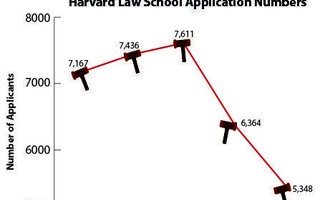With rising tuition costs and shrinking employment opportunities for law school graduates, students across the country are questioning their decision to go to law school—but not at Harvard.
Facing a job market still recovering from the recession, law schools have seen a 13.4 percent drop in applicants. Those who do apply submit 18.8 percent fewer applications.
Although applications to Harvard Law School fell by 14.6 percent last year and 16.4 percent the year before, this year is different, according to the school’s Assistant Dean and Chief Admissions Officer Jessica L. Soban ’02.
“We don’t look anything like that,” she said, adding that official numbers will be released in the fall.
As law schools throughout the United States struggle in the face of a shrinking number of opportunities available to graduates, employment rates for Harvard Law School alumni have remained somewhat constant over the past 20 years, according to Soban, a former Crimson business editor.
“It’s a really attractive time to go to a top-tier law school,” she said.
A SAFE BET
For the past three years, the Law School’s after-graduation employment rate has been about 95 percent. Most recent graduates have found full-time, long-term positions in the legal field that required the passage of the bar exam. As of mid-February, 515 of the 590 graduates of the Class of 2012 had filled such positions, according to Mark A. Weber, assistant dean for career services at the Law School. At just over 87 percent, that figure is significantly different from the comparable 56.2 percent national employment rate reported by the American Bar Association.
At schools across the country, the problem is the economy as graduates struggle to find work despite their new law degrees.
“My sense is that whether law school is worth it or not... strongly depends on how well-situated a school is and what its employment numbers look like,” said I. Glenn Cohen, who was recently granted tenure at the Law School. “For schools like Harvard, Yale, and Stanford, our students do very well. Our numbers are fantastic. It’s a pretty easy bet.”
The debt accumulated in law school, which often totals more than $100,000, makes less sense for students at lower-ranked schools, he said.
Weber said that students today are behaving rationally and performing a “cost-benefit analysis” as they assess employment opportunities after graduation.
“Many are saying that in their particular situations, it’s not a value proposition they want to take, especially when the prospects for post-graduate employment are grim,” he said. “Fortunately, that’s not a question that students at Harvard are asking.”
First-year law student Elizabeth T. Burns said she thinks Harvard is still a good bet.
“The Harvard Law School name gets you places,” she said.
Read more in University News
Faust Looks ForwardRecommended Articles
-
The Fed Must ActThe Federal Reserve is failing to fulfill its mandate to pursue the goals of price stability and maximum employment.
-
Prospects Improve for HLS GraduatesAfter a dip in hiring rates amid the financial crisis, Harvard Law School graduates’ employment prospects are steadily improving.
-
HLS Moves Up RecruitingHarvard Law School altered the 2011 schedule for their annual Early Interview Program, moving on-campus recruiting to mid-August and allowing second years to finish the entire interview process before the beginning of classes.
-
Harvard, Help us WorkSmall things have made Harvard feel just as much of a home to me as my native Costa Rica. But when it comes to getting a job, international students at Harvard have a rough time—one that could be alleviated by proper action on behalf of the university.
-
The Harvard Works Progress AdministrationHarvard can and should be able to lay off employees when it has a legitimate reason to do so. Harvard is a private institution, and the number of employees it chooses to have is a matter of neither public policy nor popular consensus.
-
 HLS Application Numbers Defy National Trend for This Cycle
HLS Application Numbers Defy National Trend for This Cycle














